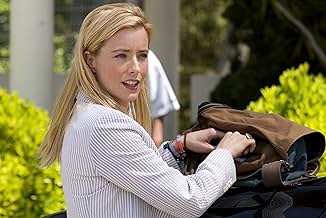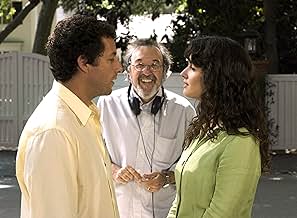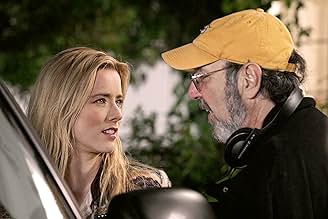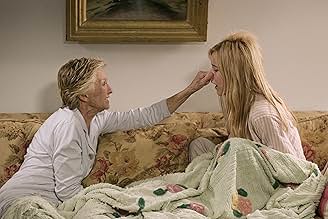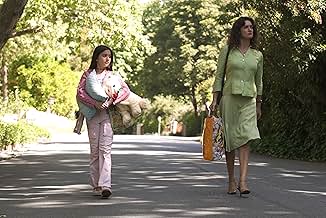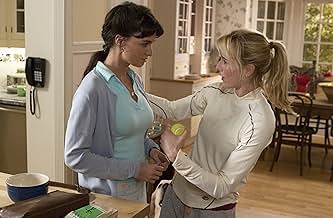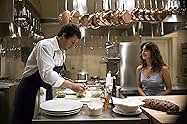Eine Frau emigriert mit ihrer Tochter von Mexiko in die USA, um ein besseres Leben zu führen. Dort arbeiten sie für die Familie eines Starkochs uns seiner untreuen Frau.Eine Frau emigriert mit ihrer Tochter von Mexiko in die USA, um ein besseres Leben zu führen. Dort arbeiten sie für die Familie eines Starkochs uns seiner untreuen Frau.Eine Frau emigriert mit ihrer Tochter von Mexiko in die USA, um ein besseres Leben zu führen. Dort arbeiten sie für die Familie eines Starkochs uns seiner untreuen Frau.
- Auszeichnungen
- 5 Gewinne & 15 Nominierungen insgesamt
Ian Donovan Hyland
- Georgie
- (as Ian Hyland)
Cecilia Suárez
- Monica
- (as Cecilia Suarez)
Empfohlene Bewertungen
Let me start by saying it's not your just another Adam Sandler movie. Though it has that undercurrent of humor, it's rich with human emotions. Allows and welcomes you to FEEL. Everything about this movie is just so right.
I am not going in to its plot or technicalities because there is no need to (only after watching this movie you'll understand what I am trying to say)
Paz Vega is so convincing (obviously) and outstanding as a caring mother who came to work and better life to US from Mexico with her daughter.
Adam Sandler plays what he plays in almost every movie. A guy with a golden heart. A good, understanding husband. A great father. Make us feel for his character. As always, he is good.
Tea Leoni is superb as frustrated, nagging wife.
Cloris Reachman provides few laughs and she's a delight to watch.
Highly recommend.
I am not going in to its plot or technicalities because there is no need to (only after watching this movie you'll understand what I am trying to say)
Paz Vega is so convincing (obviously) and outstanding as a caring mother who came to work and better life to US from Mexico with her daughter.
Adam Sandler plays what he plays in almost every movie. A guy with a golden heart. A good, understanding husband. A great father. Make us feel for his character. As always, he is good.
Tea Leoni is superb as frustrated, nagging wife.
Cloris Reachman provides few laughs and she's a delight to watch.
Highly recommend.
SPANGLISH - a term with negative connotation to numerous Spanish-Americans (or at least to the first generation or older immigrants).
As the title implies, the movie makes a very interesting and subtle social commentary about the Mexican American dynamics/contrast in society. Obviously as expected, the film illustrates a few stereotypes. For example, when Florrr's (played by Paz Vega) cousin, Cecilia hit the sliding glass door and her nose bled, the wife Deborah Clasky (played by Tia Leone) offered her money instead. It's sad but true in today's society.
But what make the film interesting are its subtleties. For instance the casting and the characters itself. The producers could have hired a blonde blue eyed male lead instead of Adam Sandler, but they did not. Why? Because Sandler's character (John Clasky) is an antithesis of the wife, Deborah Clasky. She's blonde blue eyed superficial, emotionally disturbed, patronizing, solipsistic, white housewife, who the writer ( Brooks )probably wants to portray as the epitome of everything that is bad about white people - or Americans for that matter (however exaggerated they portrayed her to be). You can empathize with the husband's character and Adam Sandler played it very well. It's interesting to note, the husbands character's last name is Clasky - possibly his ancestors were immigrants as well. And his character is portrayed as someone who "gets it", someone who understands Florrr - an immigrant mother who wants her daughter raised with her own values and integrity even though she is only a lowly servant to the Clasky's.
One of the interesting scenes in the film that I found very clever was the argument between Florrrr and John. It showed the two sides of the dynamic. While I was watching it I thought to myself, any other individual would immediately apologize and patronize the immigrant housemaid in the expense of goodwill. But I was surprised that Sandler's character actually called her a "hypocrite" instead, and she realized he has a point. Not to criticize her (it's probably what Deborah would have done) would be hypocritical as well. This is another social commentary that was written very well and cleverly portrayed in the film.
The acting is equally superb. You could just hate some of the characters specially the housewife and the daughter Cristina Moreno (played by Shelbie Bruce). You can just empathize with Adam Sandler's character and his daughter, Bernice. The only people amongst the Claskys that is very adult. The grandmother's character on the other hand (played by Cloris Leachman ) whose always drinking provides a respite to the insanity in the story and ironically always the unobtrusive and yet emphatic character despite how she lived her life. In the end she was the voice of reason for the wife.
Equally, the dialogue is worth mentioning. Interestingly, there are no subtitles on all the Spanish spoken dialogue but the audience can kind of get the gist of what's being said or argued. It can be distracting to some audiences but thankfully, Florrr's character learned to speak English in the second half of the film. Also, the Spanish without subtitles added a few good scenes in the film and added a positive credence to the title SPANGLISH. It illustrates how to write the quintessential part of the screenplay without making it too cliché.
Overall, I liked this film. If you can look at it in the same light as I saw the film, you would enjoy it too and find it cleverly written and directed. Otherwise, it could be a little slow and the dialogue can be a little bit distracting. It doesn't help some of it is in Spanish and Adam sandler's character cannot express himself very well verbally.
As the title implies, the movie makes a very interesting and subtle social commentary about the Mexican American dynamics/contrast in society. Obviously as expected, the film illustrates a few stereotypes. For example, when Florrr's (played by Paz Vega) cousin, Cecilia hit the sliding glass door and her nose bled, the wife Deborah Clasky (played by Tia Leone) offered her money instead. It's sad but true in today's society.
But what make the film interesting are its subtleties. For instance the casting and the characters itself. The producers could have hired a blonde blue eyed male lead instead of Adam Sandler, but they did not. Why? Because Sandler's character (John Clasky) is an antithesis of the wife, Deborah Clasky. She's blonde blue eyed superficial, emotionally disturbed, patronizing, solipsistic, white housewife, who the writer ( Brooks )probably wants to portray as the epitome of everything that is bad about white people - or Americans for that matter (however exaggerated they portrayed her to be). You can empathize with the husband's character and Adam Sandler played it very well. It's interesting to note, the husbands character's last name is Clasky - possibly his ancestors were immigrants as well. And his character is portrayed as someone who "gets it", someone who understands Florrr - an immigrant mother who wants her daughter raised with her own values and integrity even though she is only a lowly servant to the Clasky's.
One of the interesting scenes in the film that I found very clever was the argument between Florrrr and John. It showed the two sides of the dynamic. While I was watching it I thought to myself, any other individual would immediately apologize and patronize the immigrant housemaid in the expense of goodwill. But I was surprised that Sandler's character actually called her a "hypocrite" instead, and she realized he has a point. Not to criticize her (it's probably what Deborah would have done) would be hypocritical as well. This is another social commentary that was written very well and cleverly portrayed in the film.
The acting is equally superb. You could just hate some of the characters specially the housewife and the daughter Cristina Moreno (played by Shelbie Bruce). You can just empathize with Adam Sandler's character and his daughter, Bernice. The only people amongst the Claskys that is very adult. The grandmother's character on the other hand (played by Cloris Leachman ) whose always drinking provides a respite to the insanity in the story and ironically always the unobtrusive and yet emphatic character despite how she lived her life. In the end she was the voice of reason for the wife.
Equally, the dialogue is worth mentioning. Interestingly, there are no subtitles on all the Spanish spoken dialogue but the audience can kind of get the gist of what's being said or argued. It can be distracting to some audiences but thankfully, Florrr's character learned to speak English in the second half of the film. Also, the Spanish without subtitles added a few good scenes in the film and added a positive credence to the title SPANGLISH. It illustrates how to write the quintessential part of the screenplay without making it too cliché.
Overall, I liked this film. If you can look at it in the same light as I saw the film, you would enjoy it too and find it cleverly written and directed. Otherwise, it could be a little slow and the dialogue can be a little bit distracting. It doesn't help some of it is in Spanish and Adam sandler's character cannot express himself very well verbally.
I saw Spanglish Saturday night (12/11/04). It was a preview and I haven't seen any critical reviews yet. I liked it enough to give it a 8 out of 10. It's a comedy with enough serious moments to give a person time to pause and think. Young girl emigrates with her mom from Mexico and settles in California. Mom (being in America illegally) settles as a housekeeper for Sandler and Leoni. She's baffled by the monied existence of the upper classes and how it effects her daughter. I thought that Paz Vega is excellent as the mom. Adam Sandler holds back and plays a compassionate father. Cloris Leachman is great and should be nominated for a Best Supporting Actress. The revelation to me is Tea Leoni. I thought that she was great as the waspish/blond mom/wife who feels that she's not getting enough respect at home.
Adam Sandler returns to romantic comedy/drama in Spanglish, written and directed by James L. Brooks, who has fine tuned the genre with excellent scripts and sensitive acting (Terms of Endearment, As Good as It Gets). It doesn't quite measure up to his best work, but that's still saying something.
Deborah Clasky (Tea Leoni) hires a housekeeper/cook, Flor Moreno (Paz Vega), who doesn't speak English. Flor, a single mother, has a teenaged daughter, Cristina, and the two eventually move into a summer beach house with Leoni, her two kids, and husband, John Clasky (Adam Sandler), a world renowned chef. Deborah is a nervous, controlling type A personality, who has recently lost her job and begins to question her worth. Her subsequent actions such as lowering the self esteem of her overweight daughter, Bernice, and doting over Flor's daughter without mother's consent starts a sequence of events that pulls the two families apart and draw two frustrated, lonely people together, namely Sandler and Vega. They connect, of course, but what they do about it forms the focus of the storyline. At times this film thematically recalls classics like Roman Holiday or Brief Encounter.
The film begins in such a manner to make one think that it isn't anything special but builds its story and characters into solid foundations until you begin to care about what happens. This is almost two films thematically. There is the developing love story between Sandler and Vega, and there is also the story of Vega, the mother, and her daughter. This is not just a family torn apart or a budding, forbidden romance, it is also the core mother-daughter dynamic seen though the teenaged daughters and their respective mothers. The narrative from Cristina's point of view recalls I Remember Mama. And let us not forget the relationship of Deborah and her own mother (Cloris Leachman-a Brooks alumnus from The Mary Tyler Moore Show). The ending is a bit open ended for one storyline while the other is resolved quite nicely.
At times, the dialogue (a good portion is in Spanish and cleverly translated or communicated through context without subtitles) is crisp and sharp and other times, the story seems to tease without delivering and seemingly loses track until it gets reeled back by a brilliant line or two. Some of the situations seem a bit forced or going nowhere but Brooks has spoiled his audiences with his top flight writing over the years. It is remarkable that he can show lesser filmmakers how to write and construct a superior screenplay about people that an audience cares about. He makes stories about people that matter.
Tea Leoni is good in her role as the neurotic housewife who becomes self absorbed. At times her character downright grates on the nerves, and you wonder how a man like Sandler's compassionate, loving husband/father, puts up with her behavior. Sandler does fine with his down-to-earth, dramatic role which contrasts with his quirky romantic in Punch Drunk Love. One wonders what a stronger persona like Brooks alumnus Jack Nicholson or even Tom Hanks would have done with his role. All the supporting roles are effective as usual. Leachman registers as the mother who consoles her adult daughter and is the voice of reason despite being the family alcoholic. Even the family dog becomes a small but noteworthy supporting character. There is also an amusing cameo by Thomas Haden Church who plays a character not unlike his more substantial role in Sideways.
Production values are strong across the board particularly in the cinematography by John Seale. But it's really all about the writing and the acting. The film feels like it wants to be something more but settles for the quality of a moderate Brooks film like Broadcast News. The film will elicit laughs and some tears but it is consistently engaging. Wouldn't it be nice if more films could even reach that level of writing and acting? Is this a great film? No. It is merely a well written story, and that's pretty good on its own.
Deborah Clasky (Tea Leoni) hires a housekeeper/cook, Flor Moreno (Paz Vega), who doesn't speak English. Flor, a single mother, has a teenaged daughter, Cristina, and the two eventually move into a summer beach house with Leoni, her two kids, and husband, John Clasky (Adam Sandler), a world renowned chef. Deborah is a nervous, controlling type A personality, who has recently lost her job and begins to question her worth. Her subsequent actions such as lowering the self esteem of her overweight daughter, Bernice, and doting over Flor's daughter without mother's consent starts a sequence of events that pulls the two families apart and draw two frustrated, lonely people together, namely Sandler and Vega. They connect, of course, but what they do about it forms the focus of the storyline. At times this film thematically recalls classics like Roman Holiday or Brief Encounter.
The film begins in such a manner to make one think that it isn't anything special but builds its story and characters into solid foundations until you begin to care about what happens. This is almost two films thematically. There is the developing love story between Sandler and Vega, and there is also the story of Vega, the mother, and her daughter. This is not just a family torn apart or a budding, forbidden romance, it is also the core mother-daughter dynamic seen though the teenaged daughters and their respective mothers. The narrative from Cristina's point of view recalls I Remember Mama. And let us not forget the relationship of Deborah and her own mother (Cloris Leachman-a Brooks alumnus from The Mary Tyler Moore Show). The ending is a bit open ended for one storyline while the other is resolved quite nicely.
At times, the dialogue (a good portion is in Spanish and cleverly translated or communicated through context without subtitles) is crisp and sharp and other times, the story seems to tease without delivering and seemingly loses track until it gets reeled back by a brilliant line or two. Some of the situations seem a bit forced or going nowhere but Brooks has spoiled his audiences with his top flight writing over the years. It is remarkable that he can show lesser filmmakers how to write and construct a superior screenplay about people that an audience cares about. He makes stories about people that matter.
Tea Leoni is good in her role as the neurotic housewife who becomes self absorbed. At times her character downright grates on the nerves, and you wonder how a man like Sandler's compassionate, loving husband/father, puts up with her behavior. Sandler does fine with his down-to-earth, dramatic role which contrasts with his quirky romantic in Punch Drunk Love. One wonders what a stronger persona like Brooks alumnus Jack Nicholson or even Tom Hanks would have done with his role. All the supporting roles are effective as usual. Leachman registers as the mother who consoles her adult daughter and is the voice of reason despite being the family alcoholic. Even the family dog becomes a small but noteworthy supporting character. There is also an amusing cameo by Thomas Haden Church who plays a character not unlike his more substantial role in Sideways.
Production values are strong across the board particularly in the cinematography by John Seale. But it's really all about the writing and the acting. The film feels like it wants to be something more but settles for the quality of a moderate Brooks film like Broadcast News. The film will elicit laughs and some tears but it is consistently engaging. Wouldn't it be nice if more films could even reach that level of writing and acting? Is this a great film? No. It is merely a well written story, and that's pretty good on its own.
Spanglish navigates between drama and comedy with a strong cast and moments that capture the complexity of human relationships. However, its narrative lacks a clear storyline, unfolding more like a mosaic of interactions and conflicts among its characters.
The story is narrated by Cristina, a 17-year-old girl, as a tender recollection of her mother, Flor. Through her Princeton admission essay, the film explores her family's immigration journey, adding layers of emotional manipulation to the narrative. Flor, who learns English to better connect with the family she works for, brings invaluable common sense to a household filled with chaos.
Deborah (Téa Leoni), meanwhile, is a neurotic woman going through an identity crisis after losing her job as a commercial designer. While her behavior often crosses the line-like when she buys her daughter Bernice smaller-sized clothes to "encourage" her to lose weight-Leoni manages to make Deborah humanly endearing, even when she constantly oversteps boundaries. Her lack of consideration gives Flor an opportunity to shine with her intelligence, while Bernice and John (Adam Sandler) eloquently express their indignation, allowing the audience to draw its own conclusions.
Adam Sandler delivers a surprisingly authentic performance as John, a chef hailed as the best in America by The New York Times. While one might expect his character to be a perfectionist tyrant with anger issues, John turns out to be a sweet and genuine man-reminiscent of the lovable characters Sandler is known for. His moments with his daughter Bernice, portrayed with freshness by Sarah Steele in her film debut, are heartfelt and stand out as some of the most memorable in the movie.
Though Flor is endearing as a mother and central figure in the story, Paz Vega's character occasionally feels unreal in her reactions. Some of her decisions seem overly idealized, which detracts slightly from the credibility of her role in such an intimate and human context.
Despite its gaps in plausibility, Spanglish remains compelling, mainly because of the emotional connection it fosters between its characters and the audience. While it's not always a cohesive story, its ability to depict the ups and downs of family life and cultural tensions makes it a worthwhile journey.
The story is narrated by Cristina, a 17-year-old girl, as a tender recollection of her mother, Flor. Through her Princeton admission essay, the film explores her family's immigration journey, adding layers of emotional manipulation to the narrative. Flor, who learns English to better connect with the family she works for, brings invaluable common sense to a household filled with chaos.
Deborah (Téa Leoni), meanwhile, is a neurotic woman going through an identity crisis after losing her job as a commercial designer. While her behavior often crosses the line-like when she buys her daughter Bernice smaller-sized clothes to "encourage" her to lose weight-Leoni manages to make Deborah humanly endearing, even when she constantly oversteps boundaries. Her lack of consideration gives Flor an opportunity to shine with her intelligence, while Bernice and John (Adam Sandler) eloquently express their indignation, allowing the audience to draw its own conclusions.
Adam Sandler delivers a surprisingly authentic performance as John, a chef hailed as the best in America by The New York Times. While one might expect his character to be a perfectionist tyrant with anger issues, John turns out to be a sweet and genuine man-reminiscent of the lovable characters Sandler is known for. His moments with his daughter Bernice, portrayed with freshness by Sarah Steele in her film debut, are heartfelt and stand out as some of the most memorable in the movie.
Though Flor is endearing as a mother and central figure in the story, Paz Vega's character occasionally feels unreal in her reactions. Some of her decisions seem overly idealized, which detracts slightly from the credibility of her role in such an intimate and human context.
Despite its gaps in plausibility, Spanglish remains compelling, mainly because of the emotional connection it fosters between its characters and the audience. While it's not always a cohesive story, its ability to depict the ups and downs of family life and cultural tensions makes it a worthwhile journey.
WUSSTEST DU SCHON:
- WissenswertesThe chefs and cooks used in the kitchen scene are actual Le Cordon Bleu students from the nearby cooking school in Pasadena, California.
- PatzerWhen Deborah is picked up by Mike - The Realtor (played by Thomas Haden Church) and he backs his Audi out of the driveway, there is no license plate on the car. In the next shot, it suddenly has one.
- Zitate
Flor Moreno: Is what you want for yourself to become someone very different than me?
- Crazy CreditsNo actors were mistreated in the making of this film.
- VerbindungenFeatured in HBO First Look: The Making of 'Spanglish' (2004)
- SoundtracksHistoria de un Amor
Music by Carlos Eleta Almaran
Lyrics by Carlos Eleta Almaran
Performed by Luis Miguel
Courtesy of Warner Music Latina
By arrangement with Warner Strategic Marketing
Top-Auswahl
Melde dich zum Bewerten an und greife auf die Watchlist für personalisierte Empfehlungen zu.
- How long is Spanglish?Powered by Alexa
Details
Box Office
- Budget
- 80.000.000 $ (geschätzt)
- Bruttoertrag in den USA und Kanada
- 42.726.869 $
- Eröffnungswochenende in den USA und in Kanada
- 8.817.853 $
- 19. Dez. 2004
- Weltweiter Bruttoertrag
- 55.470.154 $
- Laufzeit2 Stunden 11 Minuten
- Farbe
- Sound-Mix
- Seitenverhältnis
- 1.85 : 1
Zu dieser Seite beitragen
Bearbeitung vorschlagen oder fehlenden Inhalt hinzufügen








